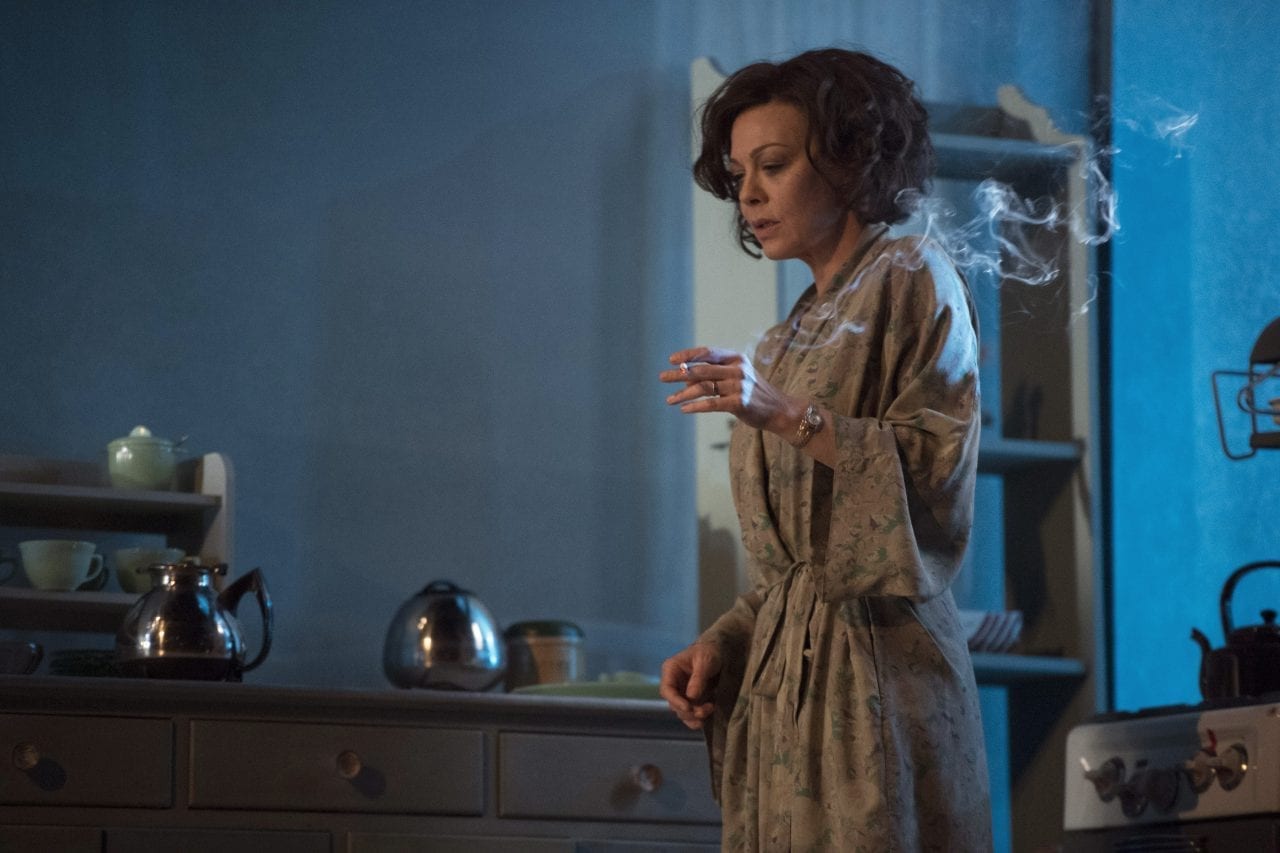Helen McCrory and Carrie Cracknell, who worked together on The National Theatre’s Medea, reunite for The Deep Blue Sea, a play with none of Medea’s wildness, but with all of its utter desperation. The Deep Blue Sea allows McCrory – who is so consistently remarkable that it has almost become expected – to run the full gamut of that desperation, bringing new depths to the role of Hester. At one point, Mr Miller (Nick Fletcher) declares that ‘to love with one’s eyes open makes life very difficult’, and McCrory’s powerful gaze creates the feeling she is always doing exactly that – helplessly making her own life ‘very difficult’. Rattigan begins the play with Hester’s prone body, with the symbol of her complete despair, the result of her open-eyed seeing, and we must continue from that point.
Designer Tom Scutt (who also worked on Medea, as well as previous excellent work on plays such as Elegy) brings a subdued fragility to the set. Blue translucent walls give the whole set a sense of something submerged, of something trembling and trapped, emphasised by the hallway staircase that reaches, pointlessly, into the air. The lighting is all intradiegetic, streetlights through windows and living room lamps, leaving the whole stage half-lit much of the time. Although this could be indicative of the fact that the Lyttleton feels like too large a stage for something as intimate as this performance, the absence of overhead spotlights means that there is no sense of there being something above, no sense of hope.
It is easy for some productions to get lost in the outdated language, the RAF slang that so irritates Hester, but Cracknell draws us out of easy clichés. This production of The Deep Blue Sea is full of echoes, of distant slamming doors, ghostly shadows moving about the other side of the translucent walls. Rattigan’s play is a partial unravelling of the surrealism of enforced manners, of Hester’s transparent lies, and it rapidly becomes apparent that it is not just Hester. The characters all become facets of a kind of post-war austerity stasis, and in their moments of confession, as they slip behind walls and become ghost-figures, then it feels like there could be a Rattigan play about them any one of them. The spectre of outside opinion – of the pressure of gossip and judgement and law – similarly haunts the play, Rattigan drawing on his own fears, and these ghostly figures emphasise that sense of whispering judgement, particularly as gossip and news about Hester flies through the apartment block.
The possibility that Cracknell draws out, however, is not to diminish McCrory’s performance – or those of the other lead actors. It is merely a widening, an illumination of possibility. McCrory is always the centre of any scene she is in, and, even when on her own, she inhabits the stage with complete possession. Lonely, gaping, unsteady silences are broken by the sound of a light switch, or of a slamming door, and we feel utterly how overwhelmingly alone Hester is in these moments. She does not flinch from collapse, or from moments of astonishing self-possession. It is a performance where we not only see Hester’s bravery, but just how much it costs her to be brave.
Tom Burke (recently seen in the BBC’s War and Peace) excels as the louche, caddish Freddie Page, with just enough of the possibility of something else beneath it all that we feel genuine regret as he resigns himself to a self-destructive spiral. Sir William Collyer (Peter Sullivan) is looming, constrained despite himself. Sullivan brings true emotion to Collyer, who can come across as a somewhat drab establishment figure, compounding the tragedy of his hopeless attempts to reach out.
This is a restrained production of The Deep Blue Sea, and perhaps all the more moving for it. We are trapped along with Hester, and this allows the focus to rest on her, where it belongs. The theatre critics of the 1950s were often shockingly unsympathetic towards Hester, but this production leaves us with nothing but a deep, abiding sense of sorrow.

